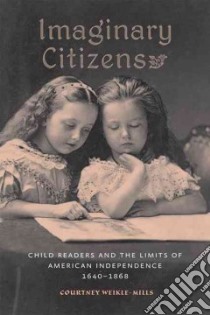- Libreria
- >
- Libri in lingua
- >
- Storia e archeologia
- >
- Storia
Imaginary Citizens - 9781421407210
Un libro in lingua di Weikle Courtney mills edito da Johns Hopkins Univ Pr, 2012
- € 54.20
- Il prezzo è variabile in funzione del cambio della valuta d’origine
From the colonial period to the end of the Civil War, children’s books taught young Americans how to be good citizens and gave them the freedom, autonomy, and possibility to imagine themselves as such, despite the actual limitations of the law concerning child citizenship. Imaginary Citizens argues that the origin and evolution of the concept of citizenship in the United States centrally involved struggles over the meaning and boundaries of childhood.
Children were thought of as more than witnesses to American history and governance—they were representatives of "the people" in general. Early on, the parent-child relationship was used as an analogy for the relationship between England and America, and later, the president was equated to a father and the people to his children.
There was a backlash, however. In order to contest the patriarchal idea that all individuals owed childlike submission to their rulers, Americans looked to new theories of human development that limited political responsibility to those with a mature ability to reason. Yet Americans also based their concept of citizenship on the idea that all people are free and accountable at every age. Courtney Weikle-Mills discusses such characters as Goody Two-Shoes, Ichabod Crane, and Tom Sawyer in terms of how they reflect these conflicting ideals.
Informazioni bibliografiche
- Titolo del Libro in lingua: Imaginary Citizens
- Sottotitolo: Child Readers and the Limits of American Independence, 1640–1868
- Lingua: English
- Autori : Weikle Courtney mills
- Editore: Johns Hopkins Univ Pr
- Collana: Johns Hopkins Univ Pr (Hardcover)
- Data di Pubblicazione: 20 Novembre '12
- Genere: LITERARY CRITICISM
- Argomenti : Children Books and reading United States History Children's literature, American History and criticism Citizenship United States History
- Pagine: 265
- Dimensioni mm: 228 x 152 x 0
- ISBN-10: 1421407213
- EAN-13: 9781421407210


